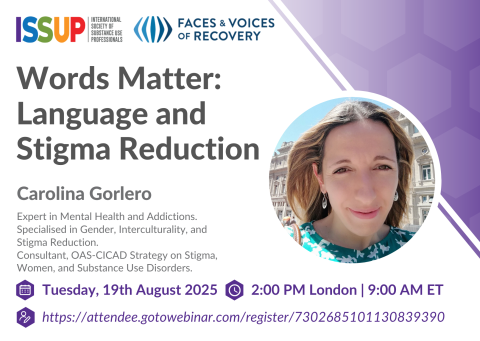Words Matter: Language and Stigma Reduction
English
Spanish

ISSUP and Faces & Voices of Recovery bring you the Global Recovery Network Webinars, a series of eight webinars taking place over the coming months, grouped under three core themes that explore global perspectives on recovery support.
Theme 2: Returning to Basics
Join us for Part 5: Words Matter: Language and Stigma Reduction, an interactive session exploring how language can either perpetuate stigma or become a powerful tool for recovery.
Date: Tuesday, 19th August 2025
Time: 2:00 PM London | 9:00 AM ET
Language shapes our perceptions, our interactions, and ultimately, our systems of care. Across the globe, individuals experiencing substance use disorders and mental health challenges face pervasive stigma—often reinforced by the very words used to describe them. This interactive session explores how language can either perpetuate stigma or become a powerful tool for equity, dignity, and recovery.
Participants will examine real-world examples of stigmatizing language, explore its impact on public policy and healthcare, and practice person-first, recovery-oriented terminology. With a global lens, we will explore culturally appropriate language shifts and learn how words can foster compassion and systemic change across borders. Designed for practitioners, advocates, and community leaders, this session aims to build a shared vocabulary rooted in respect and inclusion. Key aspects to be covered include:
-
Welcome & Introduction
-
Understanding Stigma & Language
-
Global Perspectives on Language
-
Interactive Exercise: Language Audit
-
Tools for Change
-
Wrap-Up and Call to Action
Intended audience:
This webinar is intended for:
-
Community leaders
-
Peer recovery specialists
-
Health professionals
-
Professionals in substance use treatment and prevention
-
Mental health practitioners
-
Researchers
-
Policy makers
-
Recovery advocates
Learning outcomes:
By attending this webinar, participants will be able to:
-
Explain how language contributes to stigma and impacts recovery outcomes globally.
-
Identify and replace common stigmatizing terms with person-centered, recovery-oriented language.
-
Describe the relationship between language, policy, and access to care across diverse cultural contexts.
-
Apply inclusive and empowering communication strategies in their local and international advocacy efforts.
Presenter:
Carolina Gorlero
Carolina Gorlero is a dedicated and experienced professional, with a university degree in Psychology and a master’s degree in Community Mental Health. She has over 15 years of professional experience in coordinating substance use disorder treatments and has developed and edited publications on mental health topics and led social inclusion and gender perspective strategies across various programs. Throughout her career, she has successfully spearheaded numerous initiatives aimed at improving community health outcomes and fostering collaborations among different sectors and countries.
She has extensive experience working in the field with vulnerable populations and has conducted different research projects to improve access to information for decision-makers. She has also completed various specialized courses in substance use disorder treatment, gender-sensitive approaches, and public health strategies, which have further enriched her expertise.She has served, and continues to serve, as a consultant and advisor for various international organizations, such as the United Nations International Organization for Migration (IOM), UNODC, OAS-CICAD, the Colombo Plan, and the Pan American Health Organization (PAHO). In these roles, she has worked on issues related to substance use disorders, gender, human rights, and intersectional approaches for vulnerable populations, contributing to the development of programs that promote social justice and equality.
Her role as a board member of several organizations focuses on empowering individuals from vulnerable communities, allowing her to apply innovative approaches to education and workforce development to ensure sustainable impact. She has an extensive track record of providing master training (WISE-URC) in international settings, overseeing initiatives to improve the quality of treatment centers, incorporating gender-sensitive strategies, and delivering specialized workshops aimed at capacity building. Her work is driven by a commitment to social justice and a passion for creating opportunities for populations that have historically been left behind. Additionally, she coordinates the OAS-CICAD strategy on Stigma, Women, and substance use disorders for Latin America.
Language:
The event will be in English with interpretation available in Spanish.
***********************************
Interpretation
Interpretation Instructions for Spanish speakers:
Access the Spanish Interpretation: https://meeting.interactio.com/link/recovery#app
Enter the meeting code: recovery
Select the language channel: Spanish
A few important details on how to listen to the interpretation:
By phone: The best way is to open the Interactio app and listen to the interpretation on your phone while watching the video meeting through your computer;
By computer: If you want to listen to the interpretation on the same device as the video meeting, you will need to select 'No Audio' in the GoToWebinar Control Panel, and only listen through the Interactio web app at meeting.interactio.com.
Webinars and online events delivered and hosted by the International Society of Substance Use Professionals (ISSUP) are provided for informational purposes only. They are educational in nature and do not constitute medical advice, diagnosis or treatment.
- ISSUP members can join Networks to comment – Sign in or become a member